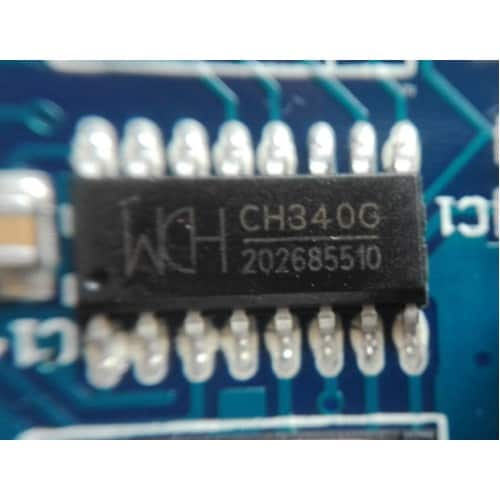

INSTALL CH340G DRIVER DRIVERS
You can find the latest version of their drivers in their English translated website here:Ĭlick on the “download” button on the WCH page to download the ch341ser.zip file to your computer.
INSTALL CH340G DRIVER INSTALL
To install the CH340G driver on your computer: The CH340G USB drivers may need to be installed on your computer before using this MEGA2560 board with the Arduino IDE. If the Arduino IDE cannot communicate with your board, it is probably because the CH340G driver is not installed on your computer. Digital I/O Pins: 54 (of which 14 provide PWM output).Flash Memory: 256 KB of which 8 KB used by bootloader.



The MEGA 2560 is compatible with most shields designed for the Arduino Uno, Duemilanove or Diecimila. It contains everything needed to support the microcontroller simply connect it to a computer with a USB cable or power it with an AC-to-DC adapter or battery.
INSTALL CH340G DRIVER SERIAL
It has 54 digital input/output pins (of which 14 can be used as PWM outputs), 16 analog inputs, 4 UARTs (hardware serial ports), a 16 MHz crystal oscillator, a USB connection, a power jack, an ICSP header, and a reset button. But using the Arduino name for the modified clone is still at least questionable.The MEGA2560 is a microcontroller (MCU) board based on the ATmega2560-16AU. I guess this is a step in the right direction. I had never heard of this company before, but there are indications on their home page that they have been around since 2007 and they have a handful of other products as well.Īnyway, it seems like someone have now designed an Arduino Nano clone that has a significantly different design than the ones I bought and probably without chips that claim to be something other than what they really are. The chip used here is a CH340 (or CH340G?) from a company called “ WCH Nanjing QinHeng Electronics“. The photos on Banggoods online store seem to be of the same product, so apparently they have updated their pictures as well. Here are photos of the board taken by Mark: Top side of Mark’s Nano Bottom side of Mark’s Nano Closeup of the CH340G chip Apparently, a completely different chip is used that does not try to look like a chip from FTDI. I have not bought any new Nanos recently, but Mark commented on one of the previous blog posts that Arduino Nano clones that he recently bought from Banggood look different and also work fine with the newest drivers from FTDI. FTDI (the company behind the original FT232RL chips) seems to have tried to make life hard for users of the counterfeit chips by putting measures in their newest drivers that will prevent them from working properly (although older versions of the drivers might work fine). I have previously written two blog posts about problems I had with Arduino Nanos I bought from Banggood and where the problem turned out to be caused by a pirated FT232RL USB-to-serial port chip.


 0 kommentar(er)
0 kommentar(er)
